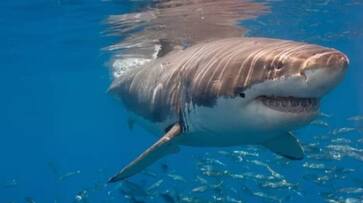Scientists have discovered that sharks off Brazil's coast tested positive for cocaine, highlighting concerns about drug pollution's impact on marine life, as revealed by a study from Brazil's Oswaldo Cruz Foundation.
Recent research conducted by Brazil's Oswaldo Cruz Foundation has unveiled a startling discovery: sharks swimming off the coast of Brazil have tested positive for cocaine. This revelation confirms long-standing suspicions among scientists that marine life may be affected by drug pollution in the oceans, predominantly around regions like Florida and South and Central America.
The study focused on 13 wild Brazilian sharp nose sharks, selected because they inhabit coastal waters where drug pollution is more likely. These sharks were dissected and tested for cocaine and its metabolite, benzoylecgonine, using advanced technology known as liquid chromatography with tandem mass spectrometry. This method revealed that all 13 sharks contained cocaine in their muscle and liver tissues, with concentrations surpassing levels found in other sea creatures by up to 100 times.
The findings mark a significant milestone as the first documented instance of cocaine presence in free-ranging sharks. Notably, the drug was more prevalent in muscle tissue compared to the sharks' livers, indicating potential differences in how these substances are metabolized within marine organisms.
Despite these alarming results, researchers caution that this field of study remains nascent. The full extent of cocaine's impact on aquatic life remains unclear and requires further investigation. Understanding the long-term effects on sharks and other marine species exposed to drug contaminants is crucial for assessing ecological health and conservation strategies.
This study underscores the complex interactions between human activities and marine ecosystems. As smuggling and drug trafficking continue to impact oceanic environments, initiatives to mitigate pollution and protect vulnerable marine life become increasingly urgent. Moving forward, scientists aim to expand research efforts to better comprehend the broader implications of drug pollution on global marine biodiversity.
Last Updated Jul 23, 2024, 3:11 PM IST









![Salman Khan sets stage on fire for Anant Ambani, Radhika Merchant pre-wedding festivities [WATCH] ATG](https://static-gi.asianetnews.com/images/01hr1hh8y86gvb4kbqgnyhc0w0/whatsapp-image-2024-03-03-at-12-24-37-pm_100x60xt.jpg)
![Pregnant Deepika Padukone dances with Ranveer Singh at Anant Ambani, Radhika Merchant pre-wedding bash [WATCH] ATG](https://static-gi.asianetnews.com/images/01hr1ffyd3nzqzgm6ba0k87vr8/whatsapp-image-2024-03-03-at-11-45-35-am_100x60xt.jpg)


